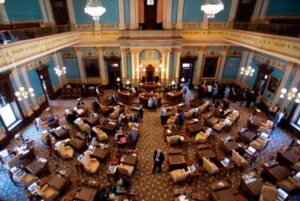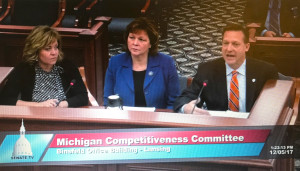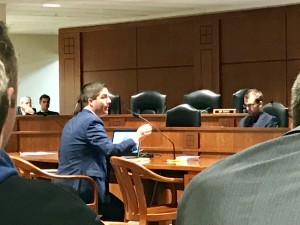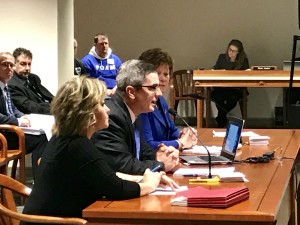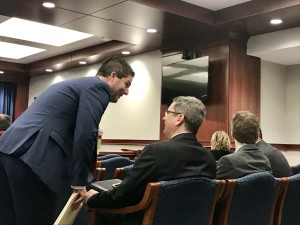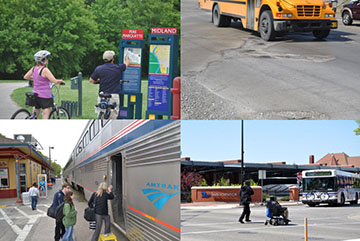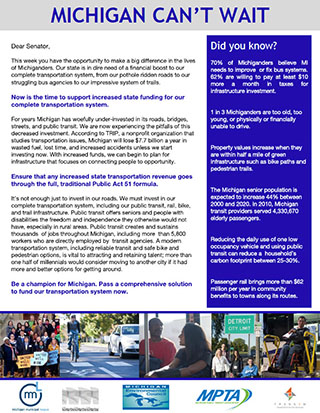A new, independent study outlining how Michigan’s municipal finance system is fundamentally broken and must be fixed was presented today to the Michigan Senate Committee on Local Government. The study by the Lincoln Institute of Land Policy explains that big solutions are needed to fix a big problem – the long-term disinvestment of Michigan’s communities.
The Michigan Municipal League greatly appreciates Chair Sen. Dale Zorn, R-Ida, and
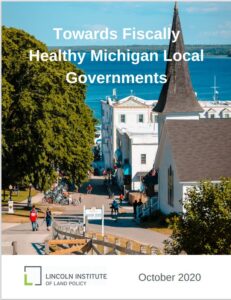
Lincoln Institute of Land Policy’s report on Michigan municipal finance system.
the committee for setting time aside today to hear about the study from the Cambridge-Mass.-based Lincoln Institute of Land Policy. The League joined Lincoln officials in October when the report was launched with the hope that the study would be presented to state lawmakers.
Titled, “Towards Fiscally Healthy Michigan Local Governments,” the Lincoln Institute report, was funded by the Charles Stewart Mott Foundation. The study shows that Michigan’s local governments were headed for fiscal distress long before COVID-19, and the pandemic has unfortunately only sped up the inevitable.
“We at Michigan Municipal League has been saying for several years now that our state’s funding of local communities is fundamentally broken and must be fixed,” said League Board President William Wild, Mayor of Westland, when the report was released in the fall. “And this report, by an independent, non-partisan organization, not even based in our state, adds to the mounting research and evidence that validates the League’s long-standing call for municipal finance reform.”
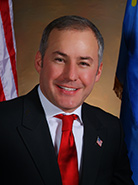
William Wild, Westland Mayor and MML Board President
Over the past few decades, the state government has implemented so many barriers for localities to achieve fiscal stability that Michigan’s counties, cities, townships, and villages could not adequately prepare for or recover from a crisis. The study recommends that now is the time for state leaders to take concerted efforts to improve the fiscal health of local governments in Michigan, for the sake of local taxpayers and businesses.
Specifically. the study found that – even before considering inflation – statutory revenue sharing has fallen from $797 million in the 1998 fiscal year to $264 million if FY 2020. “Statutory revenue sharing in Michigan has been significantly underfunded for the past two decades… repeated cuts in funding combined with changes to criteria for receiving statutory revenue have resulted in an overall loss of needed funding for local governments,” the report says.
“At the same time, Michigan has some of the tightest property tax limits in the United States, and this unusual design has contributed to large declines in property tax revenue both during and since the Great Recession, with long-lasting impacts on localities’ ability to pay for essential public services,” the report says. The report found per capita property taxes, adjusted for inflation, have dropped by 18 percent since 2007. “Michigan’s limitations on property taxes severely curb local governments’ ability to raise revenues necessary for critical local services such as road upkeep (and) fire services…”
The impact of these structural limitations on municipal revenue “affect Michigan residents’ access to opportunity and their overall quality of life. With fewer total state dollars available to localities, important programs—like capital programs, infrastructure maintenance, economic development, affordable housing, and more—take a hit, often falling short of meeting residents’ needs,” the report says. “Michigan’s businesses also suffer from these inadequate investments: residents leave areas because they want to live and work in communities that provide the resources and investments that make residents’ lives better—and thus, too many of Michigan’s localities fail their residents by design.”
The Michigan Municipal League urges state officials to remember that local governments provide the services and infrastructure that residents and businesses rely on; implementing policies that make it easier for local governments to do their job ultimately benefits the state of Michigan as a whole and the people and businesses that comprise it.
Improving state aid, the report explains, would likely be the quickest recommendation to implement, would put more dollars to work for the residents of Michigan, and would likely have the most visible impact. Relieving some of the property tax limitations or authorizing an additional local revenue source would, over time, also improve the capacity and stability of local government budgets. Efforts to address inefficiencies at the local level will likely take a lot of time, but such efforts have the potential to improve how residents view and appreciate their local government over the longer term.
“COVID-19 has certainly put a spotlight on the economic hardship communities are facing, but to be honest we were headed toward a financial crisis before the current pandemic,” Mayor Wild said about this study in a news conference in the fall. “We must act. We need our state partners to step up and help our communities. We’re more than willing to be a partner in our recovery, but we can’t do it alone.”

